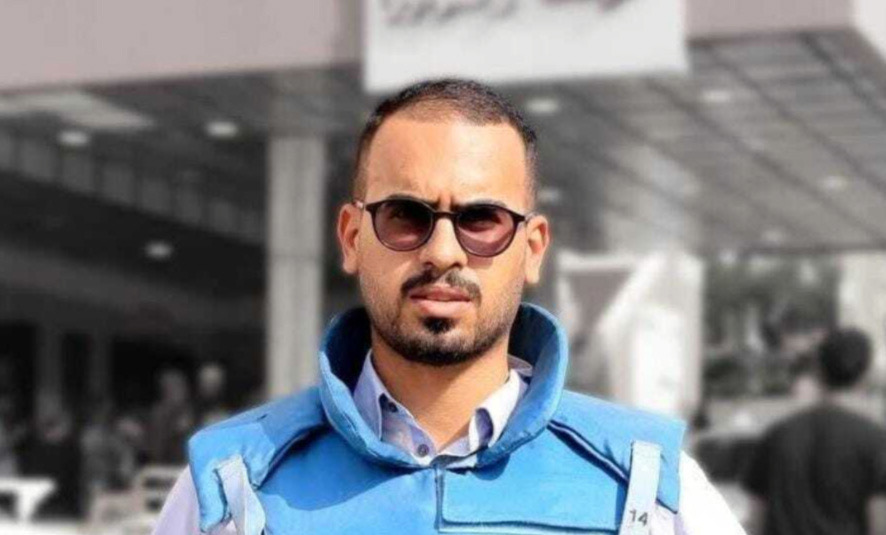Ahmed Abu Aziz was the journalist who never stopped.
Working through pain, displacement, hunger and bombardment, the 28-year-old relentlessly reported from southern Gaza for Middle East Eye throughout Israel’s genocide.
On Monday, Israel killed him alongside four other journalists and a rescue worker as they attended the scene of the latest Israeli attack on a Gaza hospital.
Reporting during one of the deadliest wars for journalists in history, Abu Aziz knew all too well the risks he took telling the truth about Israel’s onslaught.
Since October 2023, Israel has killed 245 Palestinian journalists in Gaza, several of them his friends and colleagues. Mohamed Salama, another MEE contributor, was also killed in the strike on Khan Younis’ Nasser hospital.
New MEE newsletter: Jerusalem Dispatch
Sign up to get the latest insights and analysis on
Israel-Palestine, alongside Turkey Unpacked and other MEE newsletters
“If I am killed, what will you write about me?” Abu Aziz once asked MEE’s Jerusalem bureau chief, Lubna Masarwa.
He was, Masarwa says, “exceptional”.
“He had ambition. He was very stubborn. He kept going all the way,” she recalls.
“His stories were very exceptional as well, very intimate. He had capacity to see things and to see details and to describe them in a very detailed way, especially women.”
‘The first reporter in the field’
Abu Aziz was from Khan Younis, the second-largest city in the Gaza Strip towards the enclave’s south.
He lived through four Israeli wars on Gaza, one genocide and 17 years of siege. Engaged to be married before the war, he managed to wed his fiancée, lawyer Loucy Saleh, last summer, despite his hometown being reduced to rubble.
Abu Aziz dreamed of studying abroad, to add to the master’s degree he earned in Gaza.
“Ahmed grew up in a family with a strong mother who had been working all her life,” Masarwa says.
‘Ahmad messaged me minutes before his death and was urging me to focus the coverage on the plight of children dying from starvation’
– Sameer al-Bouji, NBC journalist
In early 2024, Abu Aziz started reporting for Middle East Eye, becoming its primary correspondent in southern Gaza. He worked under the name Ahmed Aziz, for security reasons.
By May that year, he had already been displaced twice. Like most of Gaza’s population of 2.2 million, he was displaced several times afterwards.
Abu Aziz suffered from chronic back pain, the result of a cartilage injury that would sometimes hospitalise him. Treatment became near impossible over the last two years, as the Israeli war machine ravaged Gaza’s healthcare system.
One colleague recalled Abu Aziz feeling intense pain while reporting and struggling to continue. Someone offered to drive him back to hospital, but he asked if they could prop him up instead so he could finish his report.
Sameer al-Bouji, an NBC journalist in Gaza, says despite his injury, Abu Aziz “was always the first reporter in the field”.
“He was never late for any story. He was so kind. I’ve not seen men like him. I cry from the bottom of my heart. May god have mercy on his soul and the other journalists,” Bouji says.
“Ahmed messaged me minutes before his death and was urging me to focus the coverage on the plight of children dying from starvation. He was a simple but dedicated man. He only married recently and was full of dreams.”
Enduring famine
Last week, famine was officially declared in Gaza, the result of the Israeli blockade and Israel’s enforced monopoly on aid delivery.
This intentional starvation was something that Abu Aziz, like all Palestinians in Gaza, endured.
Last month, he revealed to his MEE colleagues that he had lost 14 kilograms of weight in four months. Abu Aziz was able to eat just one meal every 36 hours.
Writing about hunger in Gaza, Abu Aziz rued his inability to properly feed his wife.
Gaza famine: To be killed by an air strike is easier than watching your children starve
Ahmed Aziz
Read More »
“For months now, I’ve stopped thinking about having a child – simply because I don’t have the strength to guarantee them a life. Every morning, my wife asks me, ‘What do we have to eat?’ And I answer, trying to hide a man’s helplessness: ‘I’m fasting today’,” he wrote.
“We fast out of despair, not out of piety. We drink water when it’s available, then deceive ourselves with hope.”
His focus in the weeks leading up to his killing were on Gaza’s children, and how they were affected by starvation.
Despite Abu Aziz’s dedication, he acknowledged the toll that Israel’s genocide was taking on him.
“I’m exhausted. It’s been over a year and a half now. I never imagined my journalism career would be like this,” he wrote.
“I steer clear of making small talk with journalists around me because I can’t bear the thought of losing another friend. People can’t begin to imagine what we’re going through, daily bombing and loss. I’m not made of steel. I am internally shattered.”
Nevertheless, Abu Aziz woke up every morning, left his tent and delivered story after story.
“I work every day just to avoid staying at home, because that would destroy me. I’d rather be martyred on the field,” he wrote.
“Although I’m wounded, I can’t stop working. For my colleagues and for their memory.”

